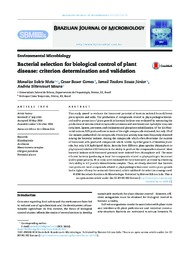Bacterial selection for biological control of plant disease: criterion determination and validation.
Bacterial selection for biological control of plant disease: criterion determination and validation.
Autoria: MOTA, M. S.; GOMES, C. B.; SOUZA JÚNIOR, I. T.; MOURA, A. B.
Resumo: This study aimed to evaluate the biocontrol potential of bacteria isolated from different plant species and soils. The production of compounds related to phytopathogen biocontrol and/or promotion of plant growth in bacterial isolates was evaluated by measuring the production of antimicrobial compounds (ammonia and antibiosis) and hydrolytic enzymes (amylases, lipases, proteases, and chitinases) and phosphate solubilization. Of the 1219 bacterial isolates, 92% produced one or more of the eight compounds evaluated, but only 1% of the isolates produced all the compounds. Proteolytic activity was most frequently observed among the bacterial isolates. Among the compounds which often determine the success of biocontrol, 43% produced compounds which inhibit mycelial growth of Monilinia fructicola, but only 11% hydrolyzed chitin. Bacteria from different plant species (rhizosphere or phylloplane) exhibited differences in the ability to produce the compounds evaluated. Most bacterial isolates with biocontrol potential were isolated from rhizospheric soil. The most ef?cient bacteria (producing at least ?ve compounds related to phytopathogen biocontrol and/or plant growth), 86 in total, were evaluated for their biocontrol potential by observing their ability to kill juvenile Mesocriconema xenoplax. Thus, we clearly observed that bacteria that produced more compounds related to phytopathogen biocontrol and/or plant growth had a higher ef?cacy for nematode biocontrol, which validated the selection strategy used.
Ano de publicação: 2017
Tipo de publicação: Artigo de periódico
Unidade: Embrapa Clima Temperado
Observações
1 - Por padrão são exibidas publicações dos últimos 20 anos. Para encontrar publicações mais antigas, configure o filtro ano de publicação, colocando o ano a partir do qual você deseja encontrar publicações. O filtro está na coluna da esquerda na busca acima.
2 - Para ler algumas publicações da Embrapa (apenas as que estão em formato ePub), é necessário ter, no celular ou computador, um desses softwares gratuitos. Sistemas Android: Google Play Livros; IOS: iBooks; Windows e Linux: software Calibre.
Acesse outras publicações
Acesse a Base de Dados da Pesquisa Agropecuária (BDPA) para consultar o acervo completo das bibliotecas da Embrapa.

